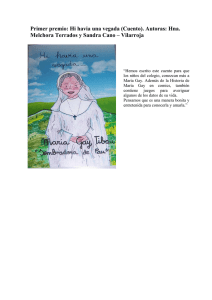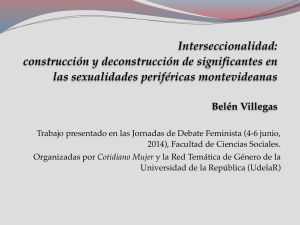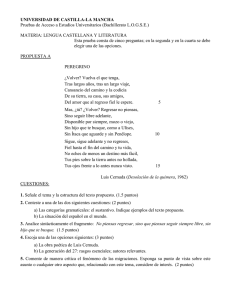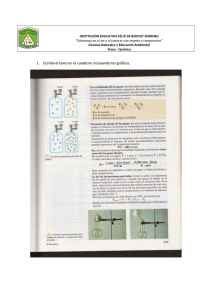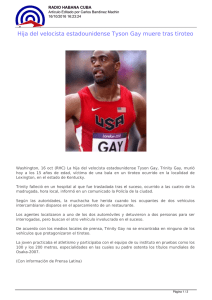El Camino hacia la aceptación para personas LGBT y sus
Anuncio
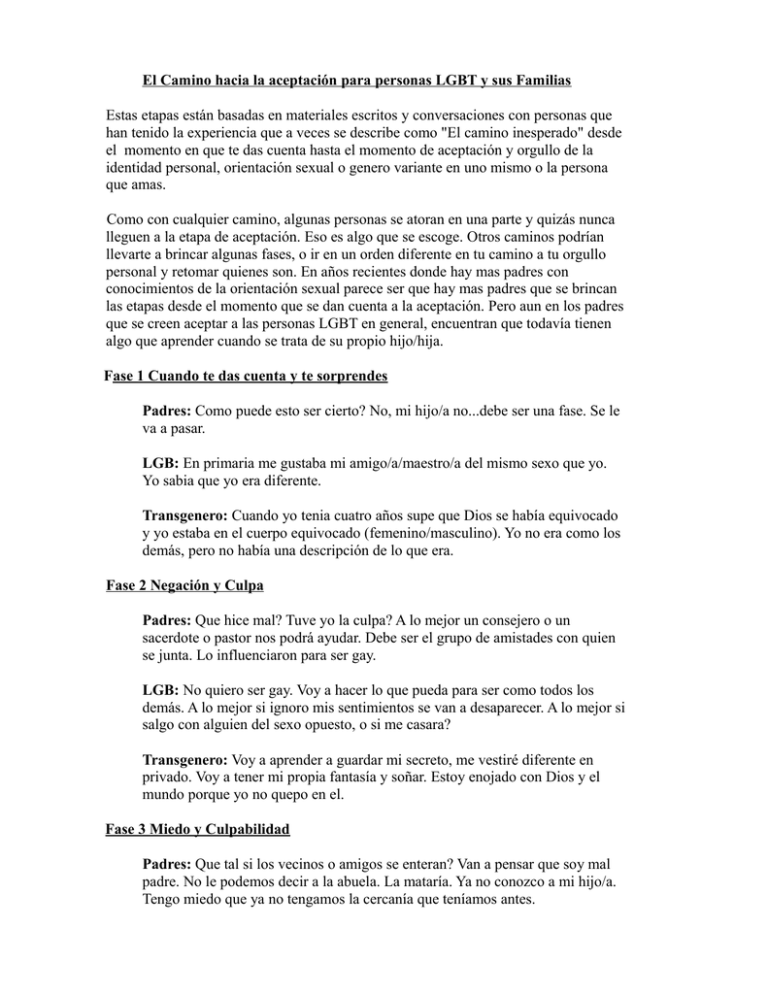
El Camino hacia la aceptación para personas LGBT y sus Familias Estas etapas están basadas en materiales escritos y conversaciones con personas que han tenido la experiencia que a veces se describe como "El camino inesperado" desde el momento en que te das cuenta hasta el momento de aceptación y orgullo de la identidad personal, orientación sexual o genero variante en uno mismo o la persona que amas. Como con cualquier camino, algunas personas se atoran en una parte y quizás nunca lleguen a la etapa de aceptación. Eso es algo que se escoge. Otros caminos podrían llevarte a brincar algunas fases, o ir en un orden diferente en tu camino a tu orgullo personal y retomar quienes son. En años recientes donde hay mas padres con conocimientos de la orientación sexual parece ser que hay mas padres que se brincan las etapas desde el momento que se dan cuenta a la aceptación. Pero aun en los padres que se creen aceptar a las personas LGBT en general, encuentran que todavía tienen algo que aprender cuando se trata de su propio hijo/hija. Fase 1 Cuando te das cuenta y te sorprendes Padres: Como puede esto ser cierto? No, mi hijo/a no...debe ser una fase. Se le va a pasar. LGB: En primaria me gustaba mi amigo/a/maestro/a del mismo sexo que yo. Yo sabia que yo era diferente. Transgenero: Cuando yo tenia cuatro años supe que Dios se había equivocado y yo estaba en el cuerpo equivocado (femenino/masculino). Yo no era como los demás, pero no había una descripción de lo que era. Fase 2 Negación y Culpa Padres: Que hice mal? Tuve yo la culpa? A lo mejor un consejero o un sacerdote o pastor nos podrá ayudar. Debe ser el grupo de amistades con quien se junta. Lo influenciaron para ser gay. LGB: No quiero ser gay. Voy a hacer lo que pueda para ser como todos los demás. A lo mejor si ignoro mis sentimientos se van a desaparecer. A lo mejor si salgo con alguien del sexo opuesto, o si me casara? Transgenero: Voy a aprender a guardar mi secreto, me vestiré diferente en privado. Voy a tener mi propia fantasía y soñar. Estoy enojado con Dios y el mundo porque yo no quepo en el. Fase 3 Miedo y Culpabilidad Padres: Que tal si los vecinos o amigos se enteran? Van a pensar que soy mal padre. No le podemos decir a la abuela. La mataría. Ya no conozco a mi hijo/a. Tengo miedo que ya no tengamos la cercanía que teníamos antes. LGB: Estoy solo/a. No puedo hablar con mis padres. Ellos no me entienden. Quizás me saquen de la casa. Me podrían golpear en la escuela si alguien se entera de mi secreto. Transgenero: Odio a las personas que se burlan de mi. Por que me esta pasando esto a mi? Es que Dios me odia también? Mis padres no me van a creer si les digo que yo debería ser del sexo opuesto. O me odiarían y me sacarían de la casa. Me siento muy triste y solo/a. Fase 4 Aprendiendo a Entender Padres: No se lo suficiente acerca de lo que quiere decir ser gay o transgenero. Sera hereditario? Sera que lo escogen? Sera un pecado? Estoy tan confundido. Que tal si mi hijo/a nunca puede cambiar? Necesito mas información. LGB: Necesito saber mas. Lo buscare en el Internet. Quizás Facebook me ayude a encontrar otros como yo. Voy a ir a lugares donde pueda conocer a otros como yo. Necesito a alguien con quien hablar. Transgenero: Voy a leer a ver que quiere decir Trans? Voy a buscar en el Internet, encontrar a otros con quien hablar.. Voy a necesitar una operación? Que le hará eso a mi vida como es ahora? Perderé todo? Fase 5 Buscando Aceptacion Padres: Leer acerca de esto no es suficiente. Necesito hablar con alguien que sepa mas acerca de esto y lo que siento. Alguien me dijo de PFLAG para apoyo. No se si quiero ir a una junta. A lo mejor conozco a alguien ahí, pero una llamada por teléfono no me lastimara. LGB: Creo que vi algo acerca de una alianza gay y heterosexual (GSA) al terminar las clases en la escuela. Si no tengo que decirle a nadie quizás lo voy a probar. Transgenero: Voy a ir a ese grupo de apoyo para transgeneros del cual me enteré. Me dicen que es confidencial, voy a ir y probarlo. Fase 6 Saliendo del closet Padres: Decidí decirle a mi familia el día de la reunión familiar. Si no lo entienden, eso sera su problema. Si pierdo amistades, ni modo. Mi hijo/a es mas importante que lo que los demás piensen. No tengo que sentirme culpable ya mas. Todavía quiero aprender mas, pero me siento mas libre. Que alivio. LGB: Ya no puedo guardar mi secreto. Le dije a mi mejor amigo/a y todo estuvo bien con el/ella. Un gran peso ha sido levantado de mi pecho. Aunque la gente me insulte con apodos, vale la pena ser yo mismo sin secretos. Se que voy a tener que salir varias veces. Estoy listo/a. Transgenero: He decidido vestirme como lo que soy adentro. Puedo aguantar las miradas y las preguntas tontas porque se quien soy. Se siente tan bien ser libre a ser el yo verdadero. Estoy muy contento/a. Fase 7 Mas allá de la Aceptación hasta el Orgulloso Activismo Padres: Estoy tan orgulloso/a de la manera en que mi hijo/a se ha aceptado. He aprendido tanto. Estoy listo/a para ayudar, para defender cuando oigo un chiste a costa de los gays, ha decirle a la gente que tengo un hijo/a gay y no sentirme avergonzado/a. A lo mejor y camino en el desfile del Orgullo Gay con PFLAG. Quizás sea tiempo de entrar a PFLAG, voy a ser voluntario/a para ayudar a otros padres. LGB: Me gusta hablar de mi historia si eso ayuda a otra persona a ser mas tolerante y aceptar. Estoy cómodo/a en mi propia piel y estoy dispuesto/a a ser parte de cualquier acción necesaria para terminar el acoso contra otros jóvenes que estén tan asustados como lo estuve yo. Hablare con los oficiales del gobierno acerca de derechos para las personas LGBT.. Transgenero: Es tiempo de ayudar. Trabajare para pasar leyes que terminen con la discriminación hacia personas como yo. Hablare públicamente para educar a las personas heterosexuales que no saben nada. Entrare a PFLAG y seré coordinador de el grupo Trans o atenderé la conferencia para crear el cambio y seré parte de el movimiento hacia la igualdad. ____________________________________________________ Creado por Jean Hodges, PFLAG Boulder en colaboración con otros padres de PFLAG y miembros de la comunidad LGBT. Algunos procesos no les quedan a todos, pero todos tenemos un proceso individual de crecimiento para aceptarnos a nosotros mismos y a otros. Estas fases fueron inspiradas por Elizabeth Kubler-Ross's Etapas de la muerte y de morir. Traducido por Patti Boman PFLAG San Diego English translation follows. The Journey to Acceptance for LGBT Persons and Their Families These stages are gleaned from written materials and conversations with people who have experienced what is often described as “the unexpected journey” from first awareness to acceptance and pride in the personal identity of sexual orientation or gender variance in themselves or someone they love. As with any journey, some may stay stuck in one place and may never reach the stage of acceptance. That’s a choice. Others’ paths may lead them to jump certain phases or they may travel in a different order on their way toward personal pride in claiming who they are. In recent years where more parents are more aware about issues of sexual orientation, there are many parents who seem to leap from first Awareness to Acceptance. However, even parents, who think of themselves as very accepting of gay and transgender people in general, find that that they still have some work to do when it comes to their own child. Phase 1 First Awareness and Shock Parent: “How can this be true? Not my child----it must be a phase. (S)he’ll grow out of it.” GLB: “In grade school I had a crush on my same-sex friend/teacher. I knew I was different.” Transgender: “When I was four I knew God had made a mistake and I was meant to be the other gender. I wasn’t like the others but I had no language for it.” Phase 2 Denial and Blame Parent: “Where did I go wrong? Am I to blame? Maybe a counselor/pastor can help. It must be the group he hangs around with. They’ve influenced him/her to be gay.” GLB: “I don’t want to be gay. I’ll do whatever I can to be like everyone else. Maybe if I ignore the feelings, they’ll go away. Maybe if I dated the opposite sex…or even got married….” Transgender: “I will learn to keep my secret. I will dress differently in private. I will have my own fantasy and pretend. I am mad at God and the world because I don’t fit in.” Phase 3 Fear and Guilt Parent: “What if our friends or the neighbors find out? They’ll think I’m a bad parent. We can’t let Grandma know. It would kill her. I don’t know my child any more. I’m scared we’ll never be close again.” GLB: “I am all alone. I can’t talk to my parents. They don’t understand me. They may kick me out of the house. I could get beat up at school if anyone finds out my secret.” Transgender: “I hate people who tease me and call me names. Why is this happening to me? Does God hate me too? My parents may not believe me if I tell them that I’m supposed to be the other gender. Or they could hate me or kick me out. I am very unhappy and alone.” Phase 4 Learning to Understand Parent: “I don’t know enough about what it means to be gay or trans. Is it hereditary? Is it a choice? Is it sinful? I’m so confused. What if my child can never change? I need more information.” GLB: “I’ve got to find out more. I’ll go on the web. Maybe Facebook will help me find others like me. I’ll hang out where I might meet someone like me. I need someone to talk to.” Transgender: “I’ll read about what trans means? I’ll go on the web, find others to talk to. Do I have to have an operation? What will that mean to my life as I know it? Will I lose everything?” Phase 5 Reaching Out for Acceptance Parent: “Reading about it isn’t enough. I need to talk with someone who knows more about this and what I’m feeling. Someone told me I should call PFLAG for support. I don’t know if I want to go to some meeting. I might know someone there but a phone call won’t hurt.” GLB: “I think I saw something about a Gay Straight Alliance after school. If we don’t have to come out to anyone, I might give it a try.” Transgender: “I’ll go to that Trans Support group I heard about. They tell me it’s confidential. Maybe I’ll drop in and check it out.” Phase 6 Coming Out Parent: “I decided to tell my family at the Family Reunion. If they don’t understand, then that’s their problem. If I lose some friends, so be it. My child is more important than what others think. I don’t have to feel guilty anymore. I still want to learn more but I feel free now. What a relief!” GLB: “I can’t keep this secret any more. I told my best friend who was cool with it. A big weight has been lifted from me. Even if people call me names, it’s worth it just to be who I am without secrets. I know coming out will have to happen over and over again. I’m ready.” Trangender: “I have decided to dress to fit the way I feel inside. I can take the stares and dumb questions because I know who I am. It feels so good to be free to be the real me. I am so happy!” Phase 7 Beyond Acceptance to Proud Activism Parent: “I am so proud of the way my child has come into her/his own. I have learned so much. Now I’m ready to give back…to speak out when I hear a gay joke, to tell others that I have a LGBT child and not feel embarrassed. I may even walk in the Pride Parade with PFLAG. Maybe it’s time to join PFLAG. I’ll volunteer to help other parents.” LGB: “I’m happy to share my story if it can help others to be more accepting. I am comfortable in my own skin and I’m willing to be part of whatever actions are necessary to stop bullying of other kids who are scared like I was. I’ll speak to my legislator about gay rights.” Transgender: “It’s time to give back. I will work to pass legislation that will end job discrimination for people like me. I will speak publicly to educate straight people who don’t have a clue. I will join PFLAG and be a Trans Coordinator or attend the Creating Change Conference to be part of the movement for equality. ” Created by Jean Hodges, PFLAG Boulder, in collaboration with other PFLAG parents and members of the LGBT community. One size does not fit all, but please be aware that for everyone there is a process of individual growth to become accepting of self and others. These phases were inspired by Elizabeth Kubler-Ross’s Stages of Death and Dying.
